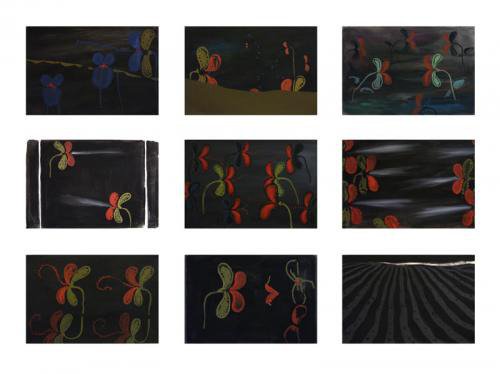Maria Serebriakova
dal 8/12/2010 al 19/1/2011
Segnalato da
8/12/2010
Maria Serebriakova
Regina Gallery, London
Suspicious Garden. The exhibition reflects Serebriakova's current focus on painting and drawing, with elements such as landscapes and commonplace objects reoccurring in her highly personal imagery achieved through minimal means and employed with a particular subtlety of touch.

Regina London is pleased to present a solo exhibition of new works by Russian artist Maria Serebriakova .
Although she has exhibited extensively throughout Europe and in her native country, this will be the first
major display to be staged in the UK. The exhibition reflects Serebriakova's current focus on painting and
drawing, with elements such as landscapes and commonplace objects reoccurring in her highly personal
imagery achieved through minimal means and employed with a particular subtlety of touch. The exhibition
includes new large-scale paintings in acrylic, as well as several cycles of works on paper.
Serebriakova was born in Moscow 1965, and she currently travels back and forth primarily to Belgium,
France, Germany and her home country. Her work therefore encapsulates both her Russian heritage and
the various cultural traditions and life-styles she encounters. This lifestyle of Serebriakova and many of
her generation is often referred to as 'artistic nomadism'. However, the working habits and inspiration for
Serebriakova's work can also be traced back to the Russian 'Peredvizhniki' (wanderer) movement which
was defined by an exceptionally emotional connection to landscape. The influence of the Russian
Conceptualism movement of the late 80's can also be observed in Serebriakova's work; the inclusion of
various objects in her work and the metaphorical status they are given allows Serebriakova to assign to
them subjective and poetic meaning, irrespective of their practical use.
The title of the current exhibition is taken from the main cycle of works on paper on display, 'Suspicious
Garden'. This shows the life-cycle of a field of anthropomorphic plants, whose green leaves and bright red
petals continue to glow in the nighttime, as they blossom, reproduce and ultimately fade away. Here, the
artist addresses the theme of life in a highly evocative manner, r evealing an interest in narrative through
symbolism and suggestion, whilst describing only the fewest of details. Elsewhere, imagery such as the
falling snow in a landscape, that descends from the sky in uniform Modernist grids, continue to suggest
that the language and pared-back vocabulary of conceptual art can be employed in a highly subjective,
lyrical manner.
Serebriakova followed her vocational training course at art school, with preliminary art couses in
preparation for art academy. However, she abandoned her studies upon discovering the avant-garde
artists of the twentieth century which profoundly resonated with her. The influence of avant -garde period
on her work can be observed, yet she predomnitly follows her own pathway. A major turning point fo r
Serebriakova, and which propelled her recognition as a major Russian artist was when she participated in
Jan Hoet's prestigious Documenta IX in Kassel, Germany 1992. Aged just twenty seven, she was the
youngest artist exhibited. Her work has also been internationally shown at ICA, Boston; at Zeno X Gallery,
Belgium, and Giorgio Persano, Italy; and in the Moscow Biennale of Contemporary Art. Her solo and group
exhibitions include the Centre for Contemporary Art in Oslo, the Stedelijk Museum Amsterdam and R egina
Gallery, Moscow, with whom she first exhibited in 2002.
In his essay 'At the Borderlands of Memory and Desire', Mark Gisbourne describes Serebriakova as having
established 'her own visual language' which combines photography, drawing, collage, sculp ture and
installation. Her focus is on everyday objects including chairs, books and tables which she observes as
being 'lifeless' and having become void of all meaning. She 're-charges' these objects by removing them
from their everyday contexts and presents them in a way which provokes a more complex and original
understanding. Her work corresponds closely with the phrase by twentieth century philosopher Ludwig
Wittgenstein: 'What we cannot speak about we must pass over in silence'. Wittgenstein understood that
not all can be expressed with language and that art has a significant role to play in allowing otherwise
'silent' ideas and subjects to 'speak'.
For further information and press enquiries please contact: +44 207 636 7768, london@reginagallery.com
Private View: Thursday, 9 December, 6-9 pm
Regina Gallery
22 Eastcastle Street, London
free admission



